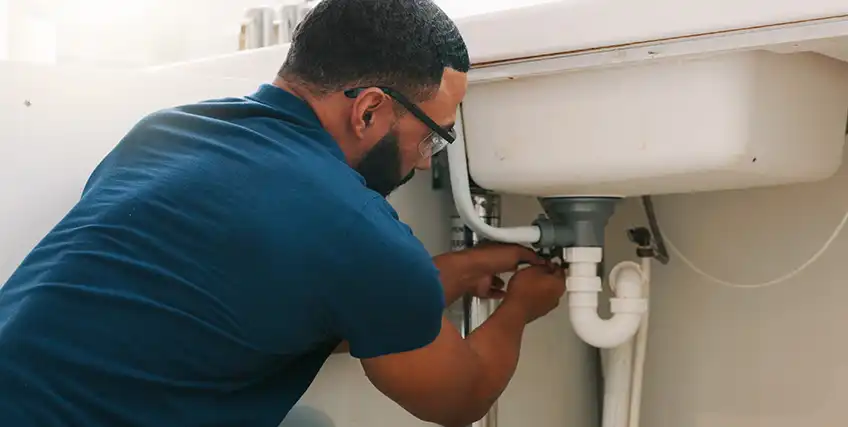5 Ways a Loan Can Grow Your Plumbing and HVAC Business
March 11, 2025 | Last Updated on: March 11, 2025

The plumbing and HVAC industry is essential, providing critical services for residential and commercial properties. Whether installing heating systems, repairing air conditioning units, or handling plumbing emergencies, demand remains steady year-round. Together, about 105,000 companies in the U.S. have annual revenues of over $200 billion. Such a large market is appealing to aspiring entrepreneurs but starting or expanding an HVAC business requires significant financial investment. From acquiring equipment to marketing services, securing the necessary funding can make the difference between struggle and success. This article serves as a guide about HVAC financing options and how to prepare your credit to finance your business.
The Cost of Starting a Plumbing or HVAC Business
Launching a plumbing or HVAC business comes with substantial upfront costs. Business owners need to invest in essential equipment, secure proper licensing and insurance, and allocate funds for marketing to attract clients.
Typical expenses include:
- HVAC tools and equipment: In addition to common tools, like wrenches, screwdrivers, and hammers, you must also purchase plumbing pipes, specialized diagnostic tools, and repair kits. The business may need to purchase HVAC equipment for customers during installation before receiving payment once the HVAC installation job is complete.
- Licensing and business insurance: A contractor license, business license and permits, general liability insurance, and bonding requirements are essential to provide customers with peace of mind.
- Marketing: Website development, online advertisements, branding materials, and local promotions can lead to HVAC jobs from new customers in your community.
- Office and storage space: Rental or purchase of an operational base for equipment and staff.
- Vehicles: Service trucks or vans equipped for on-site repairs and installations.
While you can start a plumbing or HVAC business with a bit of experience and a basic set of tools, you'll quickly need additional capital to fill out your tool chest, hire employees, and market to potential customers. For a successful launch, estimated startup costs can range from $15,000 to $100,000, depending on location, business size, and service scope.
Potential Revenue and Profit Margins of an HVAC Business
Industry statistics show that about 70% of new businesses fail within 12 months of starting, while approximately 20% of all HVAC companies fail every year. To avoid this fate for your own HVAC business, you'll need to effectively grow your business and build sustainable profits to not only pay your business expenses but also generate enough profits for your personal needs.
Understanding potential earnings helps business owners make informed financial decisions.
- The average HVAC business typically generates annual revenue between $580,000 and $1.25 million, while established companies can far exceed that.
- Profit margins for HVAC businesses range between 10% and 20%, influenced by labor costs, competition, and service pricing.
- Successful businesses optimize pricing strategies, maintain efficient operations, and invest in customer retention.
Case studies show that strategic investments—like hiring skilled HVAC technicians and using advanced equipment—lead to significant financial gains over time.
Five Ways Loans Can Grow Your Plumbing or HVAC Business
HVAC companies with financing are able to grow their business faster than those who are self-funded. There are many ways an HVAC contractor can grow their business. In the plumbing and HVAC industries, these five strategies can provide a generous return on investment that enables you to pay off the loan and increase your bottom line.
Equipment and Tool Acquisition
Investing in high-quality equipment is essential for any plumbing or HVAC business. The right tools and machinery ensure efficient service delivery, leading to greater customer satisfaction and repeat business.
Purchasing or leasing advanced equipment, such as high-efficiency HVAC systems, diagnostic tools, and specialized plumbing instruments, can be costly. Obtaining a loan allows business owners to purchase the necessary equipment without straining cash reserves. This ensures you have the latest technology to stay competitive in the market.
Expansion and Renovation
As demand for services grows, expanding operations becomes a natural next step. Whether opening a new location, upgrading an existing facility, or increasing the number of service vehicles, expansion requires substantial capital. Expanding service areas can lead to a broader customer base, increased revenue potential, and greater market presence.
Business loans provide the financial resources necessary to scale operations strategically. Monthly payments spread the costs over many years. At the same time, the increased cash flow from growing revenues makes it easier to absorb those payments.
Marketing and Branding
A strong plumbing and HVAC marketing strategy is vital for attracting new clients and establishing a solid brand identity among homeowners and landlords. Physical marketing materials like flyers and business cards are a good first step in your company messaging and to help customers recognize your business name.
Digital marketing efforts such as search engine optimization (SEO), social media marketing, and pay-per-click advertising can significantly boost visibility for your HVAC services. A budget for rewarding referrals from existing clients can be a cost-effective form of word-of-mouth marketing.
Most entrepreneurs don't have the skills or bandwidth to handle these tasks themselves. While they can hire in-house marketing staff, outsourcing marketing to professionals often makes more sense. Loans can provide the funds to build a professional website, run targeted advertising campaigns, and create branding materials. Effective marketing efforts tailored to your target market can lead to increased customer inquiries about HVAC work, higher conversion rates, and sustained business growth.
Hiring and Training HVAC Professionals
Skilled labor is a cornerstone of any successful plumbing or HVAC business. Hiring experienced HVAC technicians and providing them with adequate training ensures high-quality service delivery. However, recruitment, training programs, and employee retention initiatives come with costs.
Business loans enable owners to invest in their workforce by covering hiring expenses, employee benefits, and professional development programs. A well-trained team leads to improved service efficiency, higher customer satisfaction, and increased profitability. Training staff and certifications may also lead to additional revenue streams as you introduce new services or products to existing and potential customers.
Technology and Software Upgrades
Staying ahead in the plumbing and HVAC industry requires adopting modern technology. Investing in business management software, customer relationship management (CRM) systems, and automated booking platforms can streamline operations and enhance customer experience.
Many solutions offer affordable monthly service contracts, but the initial implementation of these technological upgrades often comes with a significant price tag. Loans provide the necessary funds to implement cutting-edge software solutions, improve operational efficiency, reduce administrative workload, and increase overall business productivity.
Where to Find Loans for Your HVAC Business
Business owners typically don't have significant balances in their bank accounts to draw upon to pay for business expansion. Even if they do, a business loan is typically the better choice because it enables them to spread the cost over many years and repay the loan with future revenues.
Each financing for business option has pros and cons, making it essential for business owners to carefully assess their needs, repayment ability, and long-term financial goals before selecting the right loan.
Here are a few common financing options to consider:
Traditional Lenders
Banks and credit unions offer business loans and lines of credit with competitive interest rates and structured repayment terms. These institutions typically require a strong credit score, a well-documented business plan, and financial statements. While the approval process can be lengthy and stringent, traditional lenders remain a reliable funding source for those who meet the requirements.
Online Lenders
Online lending platforms provide an alternative to traditional banks, offering faster approval processes and more flexible eligibility criteria. These lenders often cater to businesses with less-than-perfect credit or those needing quick funding. However, interest rates and fees may be higher, and loan terms can be less favorable than banks.
Government-Backed Loans
The U.S. Small Business Administration (SBA) provides various loan programs tailored to small businesses. SBA loans, such as the 7(a) loan and the 504 loan, offer low interest rates and extended repayment terms to help with business funding. Since the SBA guarantees loan repayment, banks are often willing to approve borrowers who cannot get approved for traditional loans.
While these loans require extensive documentation and a thorough application process, they can be an excellent option for qualified businesses.
Business Credit Cards
Business credit cards provide a revolving line of credit that can be used for day-to-day expenses, equipment purchases, and unexpected costs. They offer flexibility and rewards programs, such as cashback and travel points. However, not all vendors accept credit cards, and those who do may charge a processing fee of 3% to 5%, which can increase the cost of your purchases.
This form of financing typically has high interest rates, which makes them a poor choice for long-term debt repayment. Additionally, the risk of debt accumulation can put your business in a financial bind. Although most business credit cards don't report to personal credit reports, your credit could be negatively affected if you miss a payment or default.
Home Equity Loans and Lines of Credit (HELOCs)
Business owners who own property can leverage home equity loans and HELOCs to finance their plumbing or HVAC business. Since this form of financing is secured by your home, they typically offer lower interest rates than unsecured business loans.
Most lenders limit your home equity loan or HELOC to 80% of your home's appraised value. Depending on the balance of your first mortgage, you may not have enough equity to meet your business lending needs. Keep in mind that since these products use the home as collateral, a failure to repay could result in foreclosure.
Personal Loans
Some entrepreneurs use personal loans to fund their businesses, especially when other financing options are unavailable. These loans depend on personal credit history rather than business revenue. While personal loans can provide quick access to capital, they carry personal liability and may have higher interest rates than business loans.
Preparing Your Credit and Financials for an HVAC Business Loan Application
Before applying for your plumbing or HVAC business loan, you should boost your credit to obtain the best interest rates and loan terms. Additionally, preparing your financial documents ahead of time can expedite loan approval so you can get your money more quickly.
Improving Your Credit Score
A strong credit score is crucial when applying for a business loan, as it determines eligibility and affects interest rates. To improve your credit score, ensure that bills are paid on time, reduce outstanding debt, and avoid opening unnecessary new lines of credit. Regularly checking your credit report for errors and disputing inaccuracies can also help maintain a strong credit profile.
Financial Documentation
Lenders require various financial documents to assess the financial health and credibility of your business. These typically include business and personal tax returns, profit and loss statements, balance sheets, and bank statements. Cash flow projections demonstrating your ability to repay the loan are also essential. Organizing these documents in advance can streamline the loan application process and increase approval chances.
Business Plan Essentials
A well-structured business plan and executive summary strengthens your loan application by showing lenders a clear strategy for success. Key components include:
- SWOT Analysis: Identifying strengths, weaknesses, opportunities, and threats provides insight into market positioning.
- Marketing Plan: Outlining customer acquisition strategies, such as digital marketing and local advertising, demonstrates growth potential.
- Use of Funds: Clearly explaining how the loan will be used (e.g., equipment purchases, hiring, or marketing) reassures lenders of its necessity.
- Financial Projections: Revenue forecasts and expense estimates show long-term sustainability and repayment capability.
A compelling business plan can be hard work, but it increases lender confidence, improving approval odds and securing better loan terms. If you’re unsure about how to write a business plan, there are many templates online that can help you get started.
The Bottom Line About Financing Your Plumbing and HVAC Business
Loans play a vital role in helping entrepreneurs establish and expand their plumbing or HVAC business. With careful planning and strategic investment, business owners can maximize growth opportunities and long-term profitability. Before applying for a loan, thorough preparation ensures the best financing terms and successful utilization of funds. Assess your business needs and explore loan options that align with your goals. For additional guidance, seek resources or professional financial assistance to secure the best funding for your HVAC business.
Frequently Asked Questions (FAQs)
Can I Get a Loan to Start an HVAC Business?
Many lenders are willing to lend money to aspiring entrepreneurs with good credit, reliable income, and cash reserves. The SBA guarantees loans made by banks, which allows them to approve borrowers who may not qualify for traditional bank financing. Home equity and personal loans are another option when you cannot get approved for a business loan.
How Profitable is an HVAC Business?
HVAC business profits vary based on where the business is located, how much revenue it generates, and how much it controls expenses. The average profit margin is 2%, but it is possible to reach 10% to 20% or higher profit margins with a disciplined approach to running your business.
What Credit Score is Needed for HVAC Financing?
Credit score requirements vary by lender, the type of loan you're applying for, and how much you're borrowing. Traditional banks typically require a credit score of 680 or higher. However, online lenders may approve borrowers with credit scores as low as 500.
How to Get Funding for HVAC Business?
Entrepreneurs and small business owners can get loans for their plumbing and HVAC business through the SBA, traditional lenders, online lenders, and other financial institutions. If you cannot get approved for a business loan, tapping your home equity, borrowing against your 401(k), or taking out a personal loan are other options.
How Much Does it Cost to Start an HVAC Business?
Starting an HVAC business can run $100,000 or more if you buy everything all at once. However, many HVAC companies start out small and buy equipment and tools as they need them to complete customer jobs. This minimizes your upfront cash outlay and allows you to use customer payments to finance the purchase of tools as you go.




